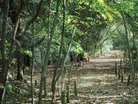Panasonic: Biodiversity, Manufacturing & GREEN IMPACT Pt 2

Welcome to part two of Panasonic’s commitments to biodiversity in its manufacturing.
Last time we explored why preserving biodiversity is so important: to manufacturers, to the world and specifically to Japan.
Today, we explore the specific initiatives The Panasonic Group is involved in that are helping to realise a more nature positive economy.
There are three specific initiatives that are having a profound impact.
- Open Innovation “Nawashiro” Initiative
- Bio CO2 Transformation technology “Novitek”
- Restoring regional flora—Kusatsu Factory “Forest of Coexistence”
The Open Innovation “Nawashiro” Initiative
Since April 2023 Koichi Matsumura, Open Innovation Promotion Department, Technology Planning Office, PHD has managed the Panasonic Group's system for nurturing technologies in their seed stage.
This system is called “Nawashiro" and is inspired by the Japanese practice of growing rice seedlings, balancing careful effort and attention.
"This initiative is known as “Nawashiro” because it nurtures the seeds of technology," says Matsumura.
"Our goal is to create themes that actively utilise industry-academia collaboration."
The system leverages academia with collaboration, providing resources and mentorship to enable new technologies to develop until they are ready for the market.
"Our approach is to study the subject area and then “go into the field for hands-on work," says Matsumara.
"We analyse data and facts using the knowledge we’ve gained, and then compile the results, hypotheses, and facts we think will be of interest to professors at Kyoto University and other universities with whom we collaborate."
Today the Panasonic Group and Kyoto University are collaborating to investigate the mechanism of natural cycles, carrying out hill-to-ocean linkage studies.
Both parties seek to establish modelling, sensing and actuation methods for material circulation in forests/ soil. They collect and analyse data from sensors that have been installed at various sites.
"We want to create opportunities to accelerate research by sharing the findings and data obtained here with researchers, including those outside of “Nawashiro.” concludes Matsumara
Tatsuo Ogawa, PHD Executive Officer and Group CTO at Panasonic Group agrees, adding:
"In July 2024, the PHD Corporate Technology Sector formulated a “Technology Future Vision” that includes themes that cannot be separated from nature—including energy, water, and food," he says.
"Nature is the source of everything.
"Using this as our starting point, we will consider new ways of doing business, of creating new communities, of producing food and new energy and new ways of recycling resources—all aligned to the theme of “nature.” We will also consider combining nature and AI. By doing so, a new future will open up for the Panasonic Group."
Bio CO2 transformation technology “Novitek”
Another initiative The Panasonic Group are pursuing is bio CO2 transformation technology.
This technology uses atmospheric CO2 as the primary source to produce a component that stimulates plant growth by harnessing photosynthetic microorganisms.
By the end of FY2025 this is expected to be commercialised as "Novitek", promoting decarbonisation whilst stimulating plant growth and increasing crop yields.
"We sought a dual vision of reducing environmental burden and creating economic value," says Novitek developer Seiji Kojima of the PHD Technology Division at Panasonic Group.
"When working with nature, the idea is to chain and amplify value in multiple stages, leveraging the power of nature at each stage. Bio CO2 Transformation starts with atmospheric CO2.
"Even when crops are being sprayed, the system seeks to improve productivity by making use of atmospheric CO2.
"Depicting this kind of value chain and amplification structure for initiatives that focus on the environment and nature is important."
Protecting the Forest of Coexistence
The Forest of Coexistence is one of the Satochi-satoyama areas we discussed in part 1. It covers 13,000 m2 at Panasonic’s Kusatsu Factory in Kusatsu City, Shiga Prefecture and is positioned as a critical green space under
the Group's Ecological Network Concept.
Under this concept the manufacturer seeks to contribute to local biodiversity while preserving the landscape.
"When founder Konosuke Matsushita visited the Kusatsu Factory in 1970, he said, “Kusatsu (Factory) is made with an emotional atmosphere by fully utilizing (or taking advantage of ) nature. In fact, that’s how I want it to be," says Takahiro Nakano, manager of the Forest of Coexistence and member of the General Affairs Department of Panasonic’s Living Appliances and Solutions Company.
"Since then, the Kusatsu Factory has been developed as a “park factory” surrounded by greenery and flowers and cherished by local residents, the “most advanced factory in the Orient” that enriches people’s lives.
"The company introduced the Ecological Network Concept to create a green space in a corner of the site and secure a habitat for wildlife while connecting it with the surrounding green space and waterfront. Known as the “Forest of Coexistence,” development began in October 2011."
Nakano notes the site's "satoyama" status, explaining how it includes woodland, waterfront and grassland, embodying the ideal of rural spaces where humans and nature coexist.
"A team of experts monitors the restoration status of the satoyama environment," he adds.
"Employees manage green areas, monitor for invasive species, and raise seedlings and plant trees.
"In October 2023, the Ministry of the Environment certified the area as an “OECM (Other Effective area based Conservation Measure) site” and the site was registered in an international database as one of Japan’s OECMs in August 2024."
Through these initiatives, Panasonic is helping to protect Japan's biodiversity, highlighting the importance of this approach to other global manufacturers.
Biodiversity should be important to everyone, and we all have a vital role- especially those in manufacturing- to play in protecting it.
Make sure you check out the latest edition of Manufacturing Digital and also sign up to our global conference series - Procurement & Supply Chain 2024 & Sustainability LIVE 2024
Manufacturing Digital is a BizClik brand.
- Henkel: Optimising Washing Through Autonomous SensorsSustainability & ESG
- Lenovo & Saudi Alat Building Green Manufacturing FacilitySustainability & ESG
- BMW: Creating Economic Circularity through Battery CreationSustainability & ESG
- Aggreko: UK Energy Manufacturers must Shore Up Supply ChainSustainability & ESG


